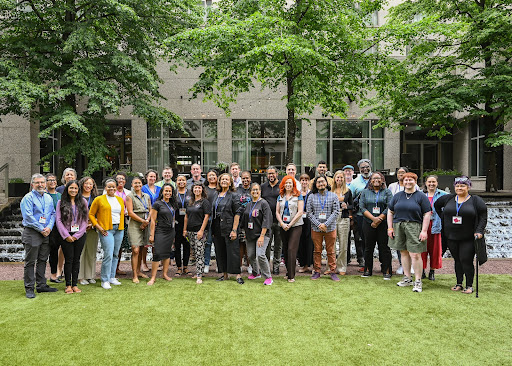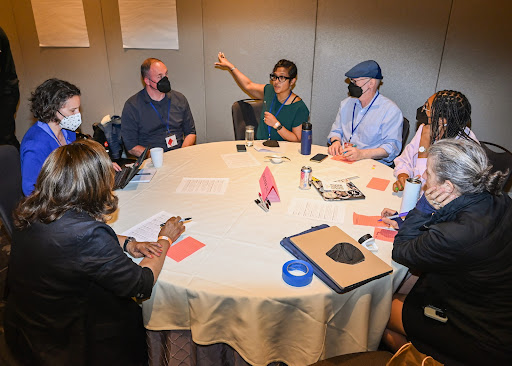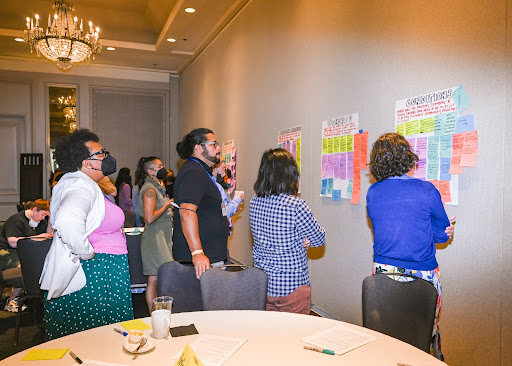
Members of the Community Climate Shift (CCS) initiative gathered in Philadelphia, PA at Sounding the Call for Community Climate Shift II from May 15-18, 2023 to mark the advancement from the planning phase of the initiative to the implementation phase. The first Sounding the Call convening was held in June 2021 and was a meeting of the minds and hearts of those embedded in building the capacity of the national movements toward justice and equity in climate work. Sounding the Call is the mechanism CCS uses when convening its partners from across the country to ensure that gatherings are rooted in and aligned with the principles, practices, and visions of movement leaders, organizers, and communities at the forefront of the climate justice movement.
The CCS initiative comprises three main groups: the CCS “Core Team”, the Building Equity in Climate Solutions (BECS) team, and the Equitable Decarbonization Partners (EDP). The CCS “Core Team” is made up of representatives from the People’s Climate Innovation Center (Climate Innovation) and the Institute for Market Transformation (IMT); together, these organizations house CCS and lead in its fundraising. The BECS group is comprised of various community-based organizations working on the frontlines of climate justice; organizations present at the convening included: POWER Interfaith, PODER SF, IMPACT Community Action, Emerald Cities Collaborative, New Jersey Environmental Justice Alliance (NJEJA), Ponder Analytics, Local Clean Energy Alliance (LCEA), Alternatives for Community and Environment (ACE), and VERDE. The EDP partners are national organizations who have technical expertise and have committed to leading the work of decarbonization with equity and justice at the forefront; organizations present at the convening included: Building Electrification Institute (BEI), Greenlink Analytics, Elevate, and Emerald Cities Collaborative. The convening was an opportunity to bring all three groups together, in-person, to fully lean into our collective power as an ecosystem.
The purpose of the convening was to increase alignment, coordination, role clarity, and shared practice as we move from the design phase to the implementation phase of Community Climate Shift. The goals of the convening were to:

We grounded ourselves in the space by naming how we want our time together to be regenerative and identifying the practices that would make this possible. We shared our visions for a collective and just future and the ways in which CCS could play a role in making that vision a reality. We also had an opportunity to hear from our partners as they shared stories from their place-based work. We heard from BEI and their work in San Jose with CBO's to create a building electrification roadmap that centers community equity priorities. We heard from LCEA and their work in the Bay Area of California where they are trying to make community choice programs benefit communities most impacted by energy burden. We learned about Elevate's work with environmental justice organizations in Chicago around building decarbonization and its intersections with health and safety. We also learned from ACE in Boston, where they passed the Building Emissions Reduction and Disclosure Ordinance (BERDO) that includes community accountability and their continued fight for equitable decarbonization.
We focused on mobilizing our visions, values, and practices, into tangible governance structures and accountability measures for the initiative. We reflected on the principles and practices of our strategic compass and made updates to reflect our progress. We discussed new governing mechanisms, including a proposal to develop a “Steering Committee” composed of CCS community-based partners who would hold key decision-making power, including decisions around projects and funding allocations, to ensure that the CCS work continues to move forward in our commitments to frontline communities. We discussed in depth the three proposed funded projects in this current phase of work, which include PODER SF, POWER in Philly, and New Jersey. In San Francisco, PODER will be working alongside Emerald Cities Collaborative to pilot two electrification demonstration projects in a low-income neighborhood that will reduce greenhouse gas emissions and provide community education on the public health and climate benefits of building decarbonization in the city. In Philly, our partners at POWER plan to mobilize and expand existing home retrofit programs to meet the needs of frontline communities at the intersection of climate and housing justice. In New Jersey, our partners hope to lead the work around building decarbonization and will begin strategizing, coalition building, and policy development that is community-led.
With constant conversations around federal programs such as the Inflation Reduction Act and Infrastructure Investment and Jobs Act making billions of dollars available for decarbonization related work, the questions around how these funds can be leveraged for climate justice remains. Our conversations focused on trying to strategize and plan how our CCS ecosystem can work collaboratively to leverage and apply to these funding opportunities to increase our capacity and scope for CCS work. Through these discussions, we created guidelines for applying to funding opportunities and initiated a shared understanding for how we can work together to access and leverage these funds.
Throughout our time together, we were able to strategize, connect, and identify ways that the CCS initiative could remain attune with the calls to action coming from communities at the frontlines of climate change and equitable decarbonization. By weaving storytelling and strategy, we identified next steps and action items for making our visions a reality. The CCS initiative grounds us in our shared vision of an equitable future, one where a Just Transition is not only possible, but also deeply embedded in the work itself. As we move forward into this next phase of the initiative, we are eager to continue to learn from and work with our fellow leaders, communities, and our ecosystems.
